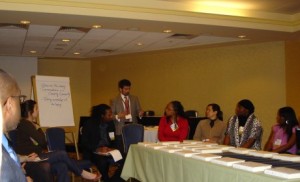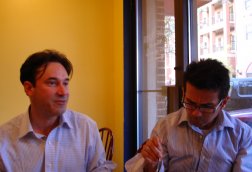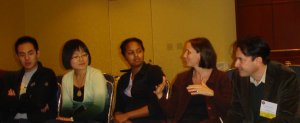What?s it all about?
As you may or may not know, I am a 2009-2011 ARL Diversity Scholar. This means that I was chosen to receive financial aid, mentoring, professional development and networking opportunities. The above benefits are provided by the ARL Initiative to Recruit a Diverse Workforce (IRDW). In return for this, ARL Diversity Scholars promise to try and work at an Association of Research Libraries member library for two years after graduation. I use the word try because ARL can’t guarantee you a job and, as we all know, there are many libraries that are cutting staff instead of hiring. What they can do is provide support and advice during your job search, and introduce you to leaders, movers and shakers in the library world heightening your exposure and recognition. The impression you make and the ability to follow through on those connections are your responsibility.

ARL Leardship Symposium
The ARL Leadership Symposium is the first event you attend as an ARL Diversity Scholar. The Symposium is a free event for MLIS students and was officially open January 16 and 17, 2010. For Diversity Scholars, this event started January 14th and included an extra day and a half of speakers, panels and networking opportunities. All costs for the Leadership Symposium were paid for by ARL and I was able to schedule my flight back two days later so that I could stay and meet my ALA Midwinter obligations.
In addition to the panel discussions and speakers, the Leadership Symposium was the first chance I had to put names to faces and meet the rest of the 2009-2011 Diversity Scholars. The group is very dynamic and I am in awe of everyone. They make me feel like I’m a slacker with all of their energy and projects. We are made up of people from a variety of ethnicities and age groups. Some of us, like myself, are career switchers. Others are experienced library workers, and some are just starting their careers. The scholarship is nice, but what really makes the ARL Diversity Scholar experience is your cohort.?While I can’t speak for past years, my cohort is inspiring, challenging and completely supportive of each other and I’m delighted to be a part of them.

ARL Initiative to Recruit a Diverse Workforce Visit to Purdue University Libraries
The Purdue University Libraries visit is a well-organized two-day whirlwind affair that introduces scholars to current issues in research libraries, cutting edge services and the staff of the Purdue University Libraries. Additionally, scholars participate in small group meetings with librarians specializing in one of their areas of interest. The first day ended with an informal gathering at the Dean of Libraries, James (Jim) Mullins, house where we were treated to excellent food, a relaxed venue and time to get to know the Purdue University librarians. The second day ended with a larger, more formal, reception that was attended by even more of the Purdue University librarians allowing us to visit with, and be advised by librarians who specialize in a wide variety of topics. Because these events were less hectic than the Symposium the Scholars were able to spend more time getting to know each other. You may be wondering why we needed more time. There are 20 Diversity Scholars in the 2009-2011 cohort all of whom are well worth knowing on a personal basis and doing exciting things in librarianship. I wish I had an extra day to spend visiting with everyone, hopefully some of us will be able to meet up at ALA Annual but I’m a little sad knowing that the whole group will probably never again be able to meet at the same time as professional obligations will dictate our future schedules.
ARL Mentoring
ARL provides several levels of mentorship outside of the conference. For my group the first level would be Mark Puente, Director of Diversity Programs for ARL. Mark coordinates the scholarship program and also provides advice on networking, job and scholarship applications, interviewing and the odd job lead. The scholars also practice peer mentoring. Many of us have a wide range of experience and because of our different backgrounds we can often help each other whether it be giving feedback on a websites, or posting new job leads we think someone might be interested in. One thing we try and keep in mind is that we are different individuals with different interests and goals. Because we are so different we are not competition for each other, but support. In addition Mark finds mentors for each applicant based on similar professional interests. My ARL mentor is Geetha Yappa, a science librarian at the University of California, Riverside. Geetha has provided advice and insight into the application process, reviewed my resume and cover letters, introduced me to other librarians with similar backgrounds and interests and provided me with job leads.
In Summary
In addition to fewer student loans I have enhanced my leadership skills, made connections with librarians from around the country, become part of a community of new librarians who are advancing librarianship, and in some cases redefining it, and gained a broader perspective on the missions and services of large academic research libraries.
I hope that this post encourages those who are eligible to apply when the call for applicants is made for the 2010 IRDW.
This is a wonderful program, I hope that in the future donors and funders will look at the people it has supported and continue to pledge funds based on the success of those who it has helped.


